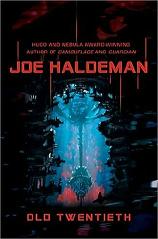
Old Twentieth
Joe Haldeman
272 pages
published in 2005
If there is such a thing as a baby boomer generation of science fiction writers, Joe Haldeman is the type specimen of them. Born in 1943 he was just old enough to be drafted at the height of the War on Vietnam after finishing college, got wounded in action and wrote his first book as a straight up retelling of his war experiences. His most famous novel is of course The Forever War (1975), which is often read as an allegory of the war and its impact on the people who fought it, a not completely unjustified view. Since then, the Vietnam war has cropped up again and again in his books as well as a more general grounding in sixties pop culture, often coupled with an encroaching sense of his own mortality as he has gotten older and obsession with the promise of evading death by becoming immortal (as e.g. The Long Habit of Living). This isn't unique to the baby boomers of course, but this was the generation that promised themselved they'd stay young forever and then found out even they weren't immune to entropy...
The Old Twentieth is a showcase for all these themes. It is not a good novel, if entertaining enough to finish. It's not a good novel not just because the plot is dull, the resolution is trite, the characters are barely twodimensional and the setting is uninteresting, but because there just seems to be no point to this novel. It's just 272 pages of not very interesting things happening, before they come to an unsatisfying conclusion and no clue as to why this story needed to be told. It reads reasonably enough on a sentence and paragraph level, but the overall story is so thin that Haldeman's obsessions shine through it, bringing them to the foreground.
The novel starts with a gimmick. We're at Gallipoli with our protagonist, Jacob Brewer, busy dragging away the rotting, bloated corpses out of no-mansland from the last battle while the current truce lasts, before returning to his trenches, where with the start of the next battle a Turkish shell almost splits him in half. It's at that point he "wakes up" and we realise it's only a v.r. simulation aqnd Jacob is actually one of the three technicians aboard a generation starship on its way to Beta Hydrii who maintain this v.r. tank. The twist is that everybody in the crew, and on Earth, is now functionally immortal and hence they're both the first and the last generation onboard the ship, which explains the virtual reality. Immortal or not, to get to Beta Hydrii will still take hundreds of years and v.r. is a nice distraction.
Virtual reality is not the only such distraction, there are all sorts of interesting "jobs" that needs doing aboard the ship or its two companions, with plenty of hobby activities available as well. It all feels like a yuppified small town paradise, but of course no paradise is complete without a snake, which turns up when somebody dies during a v.r. session. It's up to Jacob and his collegues to find out what caused this death and whether or not v.r. is still safe. Doing so means checking out various v.r. locations, all of which seem clustered in the twentieth century, a time that a bunch of immortals from centuries are strangely obsessed with, rather than with some other random period or even their own recent history.
The latter can be excused though, because as Jacob explains through the various infodumps that Haldeman uses to tell Jacob's backstory as well as that of his world, the nice yuppie immortal world is built on a pile of skulls. The treatment needed to become immortal was expensive, only the richest people could afford it and when the poorest seven billion or so people objected, war broke out, which the immortals won through genocide. Those who like Jacob lived through those days carry a heavy burden of guilt and remorse, but on the bones of the old world they've managed to build a better, cleaner world and now the time has come to move to the stars.
Better living through genocide is of course somewhat of a science fiction staple, from Heinleinesques ruminations on how there's only room for one intelligent species in the universe to the entire cozy catastrophe genre, but The Old Twentieth is the purest example I've read in a long time, with the immortals showing about as much regret about their genocide as you or I would do about the death of a loved pet. At best then these were all amoral bastards, including our protagonist, which didn't help me to identify with their struggles....
The plot goes on with more people dying in v.r., as well as reports from Earth that the same is happening there. And then somebody dies outside of v.r. and it turns out there may be a flaw in the Becker-Cendrek Process that gave them all their immortality. Our hero struggles on in his quest to prove the safety of virtual reality while political and personal circumstances start to catch up with him -- what's more, he starts to suspect the pseudo-a.i. running both the v.r. tank and most other ship functions...
This could've been gripping, was it not for the loathing I felt for all the characters and their genocidal ways by then. Anyway, Jacob runs around figuring out what's happening, then finally does and it's all a copout. It was all a dream! Or, in other words, they were all living in a simulation while their bodies were frozen and on their way to Beta Hydrii, no longer immortal due to the flaw in the Bbecker-Cendrek Process., with their brains still needing stimulation on the way. It's a not very satisfactory ending, capping a disappointing book.